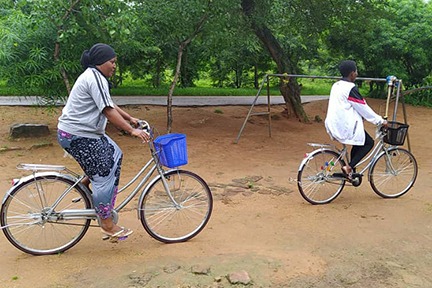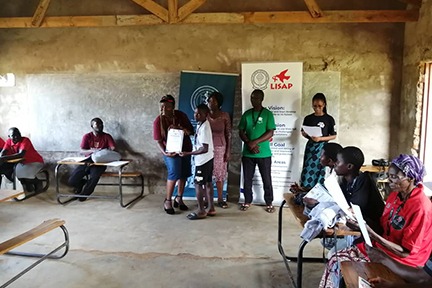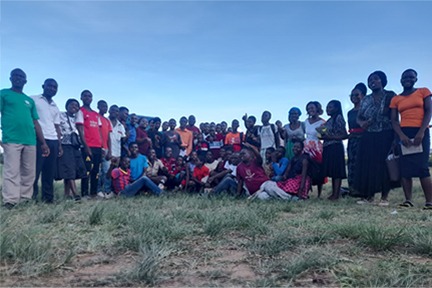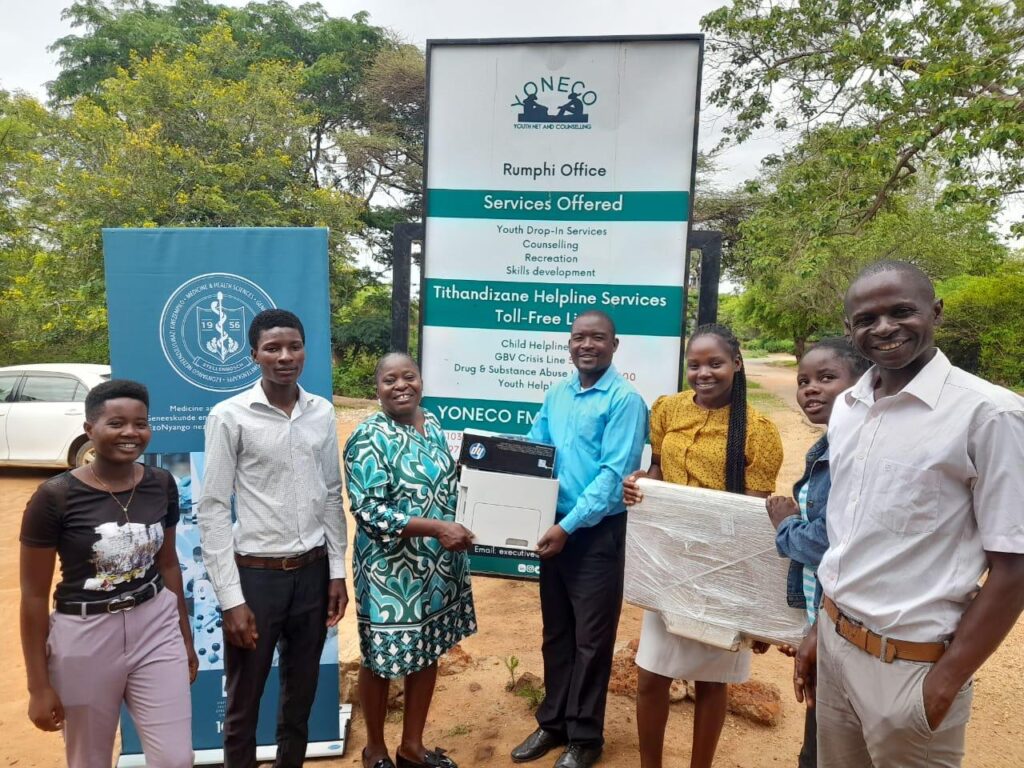
AN ONGOING global polycrisis is putting immense pressure on world leaders and organisations. Despite increased awareness, national and multinational role players are battling to provide the necessary relief and solutions. An approach that starts at a community level is therefore increasingly favoured. The collaboration between several community-based organisations (CBOs) in Malawi, with support from Stellenbosch University (SU), is proving how effective a grassroots approach can be in addressing real needs.
It takes only one partnership to trigger a chain reaction of collaboration
It all started with Dr Juliet Nyasulu, a proud Malawian who today is a senior lecturer at the Division of Health Systems and Public Health in SU’s Faculty of Medicine and Health Sciences. She wanted to invest in the community she grew up in, for example through motivational talks to youth and sourcing funding to meet community needs. “I grew up in the same environment. Today I have a doctorate and work at an internationally recognised university. By telling my story, I want to inspire and motivate the young people to become the best they can be.”
In 2021, Nyasulu partnered with a CBO called TrueVision, which supports children and teenagers from 18 schools in the Mzimba district who are part of children’s corner clubs (for in- and out-of-school youths), teen clubs or antiretroviral therapy (ART) adherence clubs for HIV positive youth. TrueVision focuses on protecting children from different forms of abuse – which is a significant problem in Malawi – and ensuring access to quality health services. The youth clubs do not only help to prevent abuse; their activities also support the children’s cognitive development, which is often compromised as a result of abuse. In support of these activities, Nyasulu sourced funding for sports equipment and games, as well as 800 fruit trees for vulnerable families in the area in 2022.
In the same year, Nyasulu ─ with support from knowledge, interchange and collaboration (KIC) funding from the National Research Foundation ─ provided training and mentoring to team members of a national NGO, Youth Network Counselling (Yoneco), to equip them to document their public health programme outcomes scientifically. Ten abstracts were developed and are being presented on various scientific platforms, including international conferences. In engaging with the interventions at the Yoneco office in the Rumphi district, she became aware of the challenges faced by local child protection committee members and the Tionge women group, which included mobility and low household income respectively. In the women’s case, poverty often forces them into circumstances that increase their risk of contracting HIV.
The next step was to bring together Yoneco and another local initiative, Livingstonia Synod Aids Programme (Lisap), to support TrueVision practically. Further funding and support from SU’s Africa Centre for HIV/Aids Management culminated in an effective social impact project at the end of 2023. According to Africa Centre director Dr Munya Saruchera, the collaboration with the Division of Health Systems and Public Health was a logical result of efforts to close the gap between health and management science in a community setting. “The local Malawian NGO partners then added their magic to the mix for an all-round winning outcome. Letting communities lead remains the clarion call and we have to see that in action at every opportunity.”
In December, Yoneco and Lisap came together with TrueVision to present a three-day workshop at Thofu Primary School to provide life skills training to 52 peer educators from youth clubs across Mzimba, with a focus on HIV/Aids and sexual reproductive health and rights (SRHR). The training was facilitated by the Mzimba North health and social welfare offices, and was followed by a graduation ceremony.
Prioritise mental health to improve youth’s socioeconomic standing
The training topics were strategically selected based on the challenges that youth in the area face, such as increasing mental health issues and suicide. These are often exacerbated by HIV/Aids, with young people ending their lives because they cannot accept their HIV status. According to Gillian Msampha, an Africa Centre alumnus, the training focused on helping the youth become beacons of resilience amidst these profound challenges they face, empowering them to “not just survive but thrive”.
During an interview with Malawian news station Times TV, Nyasulu said that she believes economic and social youth empowerment is critical to addressing mental health problems among youths: “We need to prioritise mental health and nutrition in strategies to fight socioeconomic challenges, including empowering families and communities to identify mental health issues and developing relevant support systems.”
Based on this reality, the life skills component focused on topics such as self-awareness and self-esteem, decision-making, goal-setting and managing stress and anxiety. In terms of HIV/Aids and SRHR, abortion, STIs, teenage pregnancies and child marriage were in the spotlight. While peer educators were equipped with skills to provide psychosocial support themselves, they were also provided with information on community-based child protection structures and systems for continued support.
Bringing about big changes by combining small gestures
At the graduation ceremony, several donations were handed out to help address specific community needs among local youth and women. The Africa Centre donated computers, printers and a camera to youth clubs in the area. Mhub, Malawi’s first technology hub that provides support to young innovators and entrepreneurs, committed to providing computer training to 20 youths and community stakeholders so that they can open computer centres and generate an income.
In addition to funding from the Africa Centre for life skills training, Nyasulu sourced funding to procure and donate the following, based on the needs she identified during her interactions with Yoneco Rumphi in 2022:
- Four bicycles; two for child protection committee members and two for TrueVision volunteers as a means of transport to get around the community.
- Ten multiplication goats for the Tionge women group to enable the women to earn a livelihood. (Goats usually give birth twice a year, which makes them a good choice of livestock for earning an income relatively quickly.) As the goats multiply, the group members will share the goats and, in the end, every woman will own goats.
Consider paying it forward
At the heart of successful community mobilisation are community members who are invested in their community, even if they reside somewhere else. This is also the message Nyasulu wants to spread through her example: “I want to urge other Malawians who have achieved great things to consider giving back to their community and to inspire the local youth. We often forget to go back to our roots, despite our success in life often being attributable to someone from that community.” This of course applies to any country and community; we all have a part to play in addressing the most pressing challenges of our time.
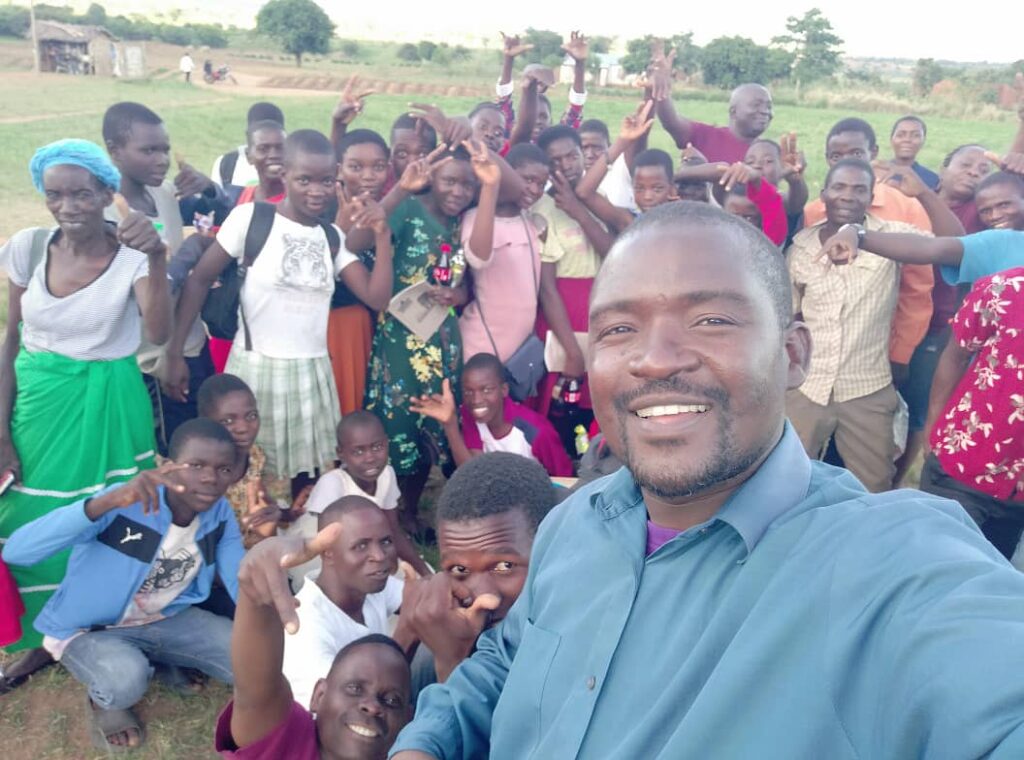
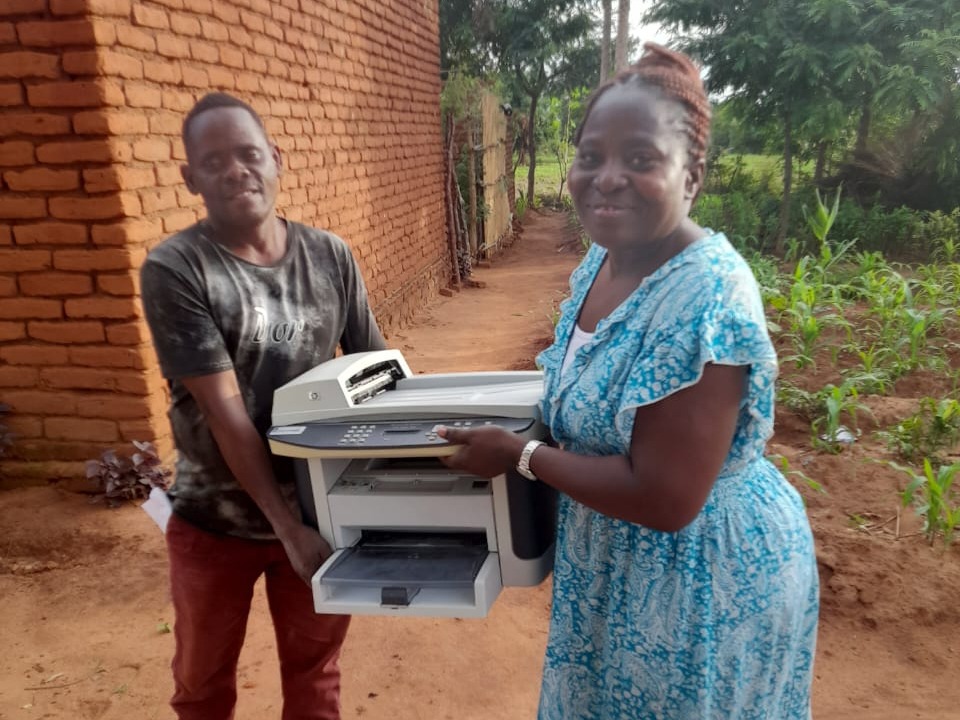
Dave Mkandawire (TrueVision coordinator) and Juliet Nyasulu carrying one of the donated printers that the youth will be able to use for their benefit.
